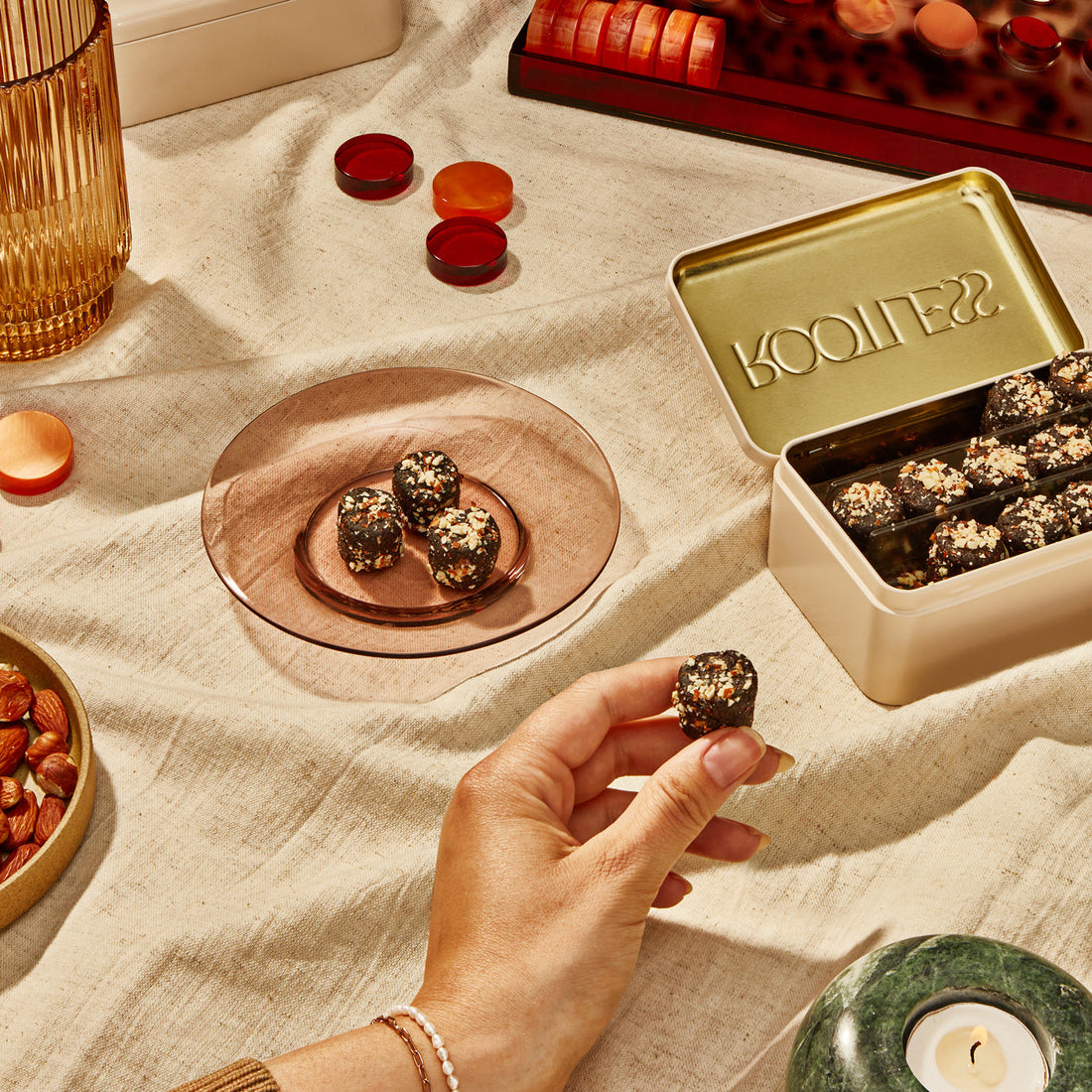Let’s get one thing straight: menopause isn’t an ending. It’s a rewiring. A radical rebalance. A biological remix with the potential to be one of the most powerful phases of your life, if you’re supported for it.
At Rootless, we don’t believe in silence or stigma. We believe in knowledge, nourishment, and ownership. So whether you’re just beginning to notice changes or deep in the middle of hot flash city, this guide is your roadmap: science-backed, no-BS, and full of real tools (including our favorite sea veggie) to help you thrive through every stage.
1. What is Menopause?
Menopause is a multi-year journey your body goes through as your hormone levels (especially estrogen and progesterone) go on a rollercoaster and then once again find a steady state in decline.
Technically, menopause is defined as when you haven’t had a period for 12 months consecutively (and if it comes back, your timer starts over). But the symptoms start earlier, and can last long after that one-year mark.
And it’s not just about periods stopping. It’s about your brain, bones, heart, gut, skin, mood, and metabolism all recalibrating in real time.
This isn’t “just a phase.” It’s a total system update. And your body deserves real support to move through it.
2. The Three Stages of Menopause
Here’s how the journey typically unfolds:
-
Perimenopause: Starts as early as your mid-30s, but usually hits in your 40s. Periods may become irregular, or they may be business as usual. Symptoms ramp up as your hormones fluctuate wildly.
-
Menopause: Officially defined as when you’ve gone 12 months without a period consecutively. The average age in the U.S. is 51.
-
Postmenopause: Your hormones settle into new rhythms, and long-term health shifts (like bone and heart changes) become the focus.
3. Symptoms (aka the 40+ Signs Your Body Is Changing)
Every woman’s menopause experience is unique, but here are the most common hormone-driven symptoms to watch for:
-
🔥 Hot flashes + night sweats
-
😡 Mood swings, anxiety, and feeling emotionally off
-
😴 Sleep disruptions that steal your energy
-
📉 Weight gain or a sudden metabolism slowdown
-
💧 Vaginal dryness and libido shifts
-
🧠 Brain fog and trouble concentrating
-
🦴 Bone density loss and increased heart risk
Some of these symptoms are obvious. Others are sneakier. That’s why tracking and talking about it matters.
4. The Emotional Side No One Warns You About
Hormones don’t just change your body; they change your identity, relationships, and confidence.
And yet, most of us are left to figure it out solo.
This is your permission slip to seek support: from a therapist, a menopause coach, your BFF, or a doctor. You don’t have to do this alone.
5. Lifestyle Shifts That Actually Help
You can’t out-supplement a lifestyle that’s not aligned. These are the shifts that science (and many Rootless women) swear by:
Eat like your hormones matter:
-
Add: calcium-rich foods, leafy greens, seaweed, omega-3s, flaxseed
-
Limit: refined sugars, alcohol, excess caffeine
Move your body, but make it work with you
- Prioritize strength training to protect bones and boost metabolism
- Gentle cardio + yoga help regulate cortisol and support sleep
-
Start tracking how many macros (protein, carbs and fat) you eat each day
Mind your mental:
-
Stress is a hormone disruptor.
-
Try: meditation, journaling, breathwork, saying no, sleeping more
6. So is seaweed really a menopause superfood?
Yep. You knew this was coming. But the hype is real.
Why we love seaweed (and built Rootless around it):
| Nutrient | Why It Matters in Menopause |
| Iodine | Supports thyroid health, which regulates metabolism and energy |
| A host of minerals and vitamins | Support the inner rhythms that control how you feel, think, and function each day |
| Prebiotic Fiber and Polysaccharides | Feeds your gut microbiome, which is tied to hormonal harmony |
| Polyphenols | Natural antioxidants that help with inflammation and detox |
Did we mention seaweed may support healthy weight management by regulating blood sugar and reducing cravings?
Rootless makes getting this support daily (and delicious) with our Daily Bite. No pills, no fishy aftertaste, just a whole-food ritual that feeds your hormonal foundation.
👉 Learn more about seaweed’s benefits for women.
7. What About Supplements?
Nature has a few allies worth exploring, with your provider’s guidance, of course.
-
Phytoestrogens, while not a replacement for estrogen (like soy and flaxseed) can support your body during menopause
-
Black cohosh, ashwagandha, and red clover show promise for hot flashes and mood
-
Magnesium, Vitamin D, Omega-3s, and yep, iodine support systems in flux
- Always look for clean, clinically-backed, and dosage-aware options, where available.
8. Medical Options You Can Talk to Your Doctor About
Sometimes food and herbs aren’t enough, and that’s okay.
Talk to your provider if you’re considering:
-
HRT (Hormone Replacement Therapy), especially for severe symptoms or bone density concerns
-
Non-hormonal prescriptions for sleep, mood, or vaginal dryness
-
Routine screenings for osteoporosis, cholesterol, and thyroid health
9. Build Your Village: Menopause Support Resources
No more white-knuckling it. Here’s what’s out there:
-
Menopause coaches and certified health guides
-
Online communities like The Pause Life, Hello Menopause, and more
-
Tracking apps to log symptoms and cycle changes
-
Podcasts and books: Next Level by Stacy Sims, Flash Count Diary, The Menopause Manifesto
10. The Rootless Reframe: Your Second Act Starts Here
Menopause doesn’t mark the end of your vitality. It marks the beginning of your next evolution.
You’re not losing your spark. You’re learning how to fuel it differently.
✨ Build your plan.
✨ Rebuild your root system.
✨ Let nourishment, not depletion, lead the way.
And if you’re ready to feed your hormones with something real?
Try Rootless Daily Bites, and see what happens when your thyroid, gut, and metabolism get the memo.
